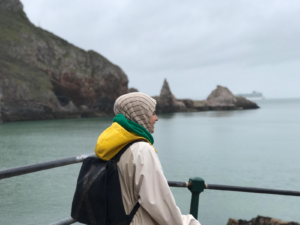Dondu Sarisen is a third year PhD student in Centre for Water System, CEMPS at the University of Exeter. After few years working in a company in Turkey, she decided to pursue her career in academia.
Working on a PhD project is like taking a journey. With your proposal, you know where to go / or where do you want to go, but you don’t actually know how to go. If you come across road closures, then it is your responsibility to change your approach, and sometimes this change might require you to wander entirely new foreign roads. Supervisors are there to make your journey easier by guiding you.
They will question your work, challenge you, and their expectation will increase in time. But I have gradually realised that all of those led me to somewhere that I can see the rest of the road clearly.
There are many times I was anticipating the roads to be straight, but the reality proved to be the opposite, resulting in struggling across sinuous roads. Going through this contributed to my development both as a researcher and as a person. Sometimes I only focus on the progress that I have made and think that going through all these roads without reaching anywhere, without getting any results, is just a waste of time. In fact, they are all necessary to be able to walk faster. In this way, your progress speeds up in the late stage of your PhD.
Modest Recommendations Working with Supervisors
A PhD is your trip, and supervisors are there to help you; bear this in mind all of the time. Supervisors are aware of everything as they have lots of experience. They have done the PhD before, so they can easily empathise with you. They have also worked with or working with other PhD students so they know when to pressure you to work hard or when to give you some time off.
Here are some of my suggestions regarding working with your supervisors:
- Some of you may find reporting to supervisors regularly stressful, but believe me, it is beneficial. You never know where the discussion goes and how useful it would be
- Don’t skip any meetings even if you don’t have a lot to discuss. Show them what you have worked on and what are you planning to do
- Don’t hesitate to discuss the topic. Supportive discussion contributes to your project
- They may forget what you have discussed in the previous meeting. So remind them
- Don’t expect them to know everything related to your project. You are the expert in this field
- Write down everything that they advise you and try to stick with them by considering your own opinion
- Be concise and to the point writing the email as they don’t have too much time to read
- Be kind and patient. They are very busy, and your project is not the only thing they focus on
Remember, this is your journey, but you do not want to lose the opportunity of having an opinion of a wise person during your trip.

